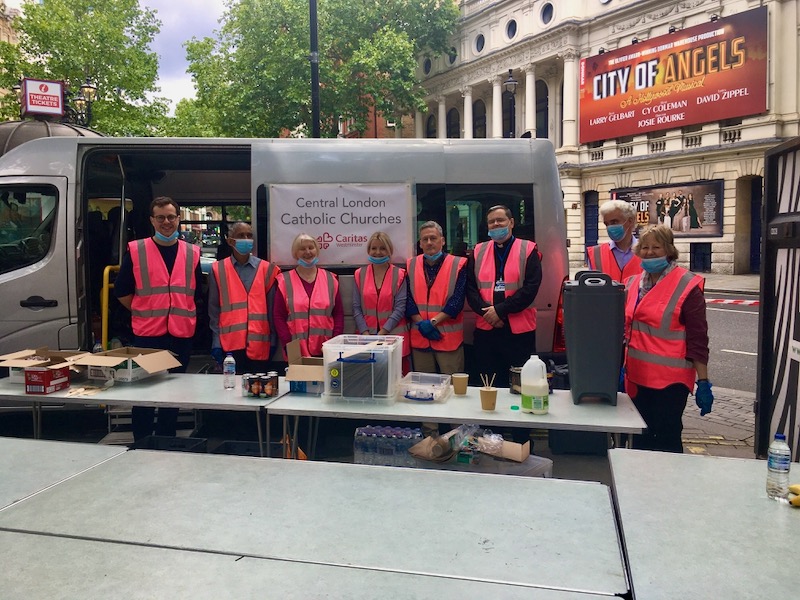As lockdown measures begin to ease, destitute asylum seekers supported by the Jesuit Refugee Service (JRS) continue to feel the catastrophic impact of the pandemic, including isolation and hunger, and are facing a potential fresh crisis of homelessness.
“Many of the destitute asylum seekers JRS supports were already living in uncertainty and crisis, and the pandemic has exacerbated these dire circumstances”, Sarah Teather director of JRS UK told The Tablet. “As lockdown eases, we continue to hear devastating stories every day from those unable to access housing, healthcare, food, or urgent legal advice.”
She thanked donors to the JRS emergency appeal and called for more financial support and volunteering – JRS UK on 020 7488 7310 or email uk@jrs.net.
JRS continues to distribute parcels of essential food and toiletries across London, delivering more than 800 since lockdown began, and regular mobile phone top-ups. The service continues to provide support to those experiencing indefinite immigration detention, who have faced added barriers during the pandemic.
The JRS UK report ‘Detained and Dehumanised: The impact of immigration detention’ was mentioned by several MPs during a debate on amendments to the Immigration and Social Security Coordination (EU withdrawal) Bill on 30 June which called for a 28 day time limit to detention. The amendments were rejected.
“Repeatedly, we see that insecure immigration status is still treated as a barrier to vital support, and to participation and this has long had a hugely negative impact on human lives and on communities,” said JRS, calling for a period of leave to remain for all with insecure immigration status.
“As lockdown eases, homelessness remains a key, primary concern for our work, as the threat of evictions from local authority accommodation and possible discontinuations of asylum support loom ever closer, with a very probable fresh housing crisis in sight.”
JRS is concerned that those they support are being banned from work or accessing public funds and therefore are dependent on charities and spaces on friends’ floors to survive. Many are left in an even more unstable and vulnerable position and exposed to Covid-19.
Westminster Justice and Peace also underlined rising homelessness in Central London, with many being refugees. It has called for a temporary reprieve for those who have no income at this time, including asylum seekers.
“We’re seeing many new homeless on the streets with no recourse to public funds and are working with the Catholic Union and JRS to support them” said the chair, Fr Dominic Robinson SJ this week.
Cardinal Vincent Nichols has supported the call for the Home Office to suspend rules that mean some asylum seekers and refugees have no recourse to public funds such as housing support, as charities warn of rising homelessness.
Fr Dominic reported that the Central London Catholic Churches’ volunteers, in liaison with Caritas Westminster, have now moved from Trafalgar Square to Warwick Street and are providing food, water and showers to hundreds of homeless. “We want to keep this in the news and have asked for meetings with politicians to lobby for people to be given what is necessary to live with dignity,” said Fr Dominic.
St Chad’s Sanctuary in Birmingham also reports that its outreach to refugees and asylum seekers continues to overcome the challenges of lockdown. “It has certainly been a challenging time and we are proud to say that rather than reduce our services during the pandemic, here at St Chad’s Sanctuary we have not only kept functioning but we have increased our offering,” Abigail Martin told The Tablet.
St Chad’s has remained open to give out food and clothing to asylum seekers and refugees, but with two staff a day rather than the usual 40-plus volunteers and staff.
“While we cannot now welcome people into the building for a cup of tea and a chat as we used to, we hand out bottles of drink and snack food to people queueing,” Ms Martin reported. Clothes are passed out in bundles through the window. English lessons were moved online and the school team has continued to fight for the children who have not been granted a school place whilst providing them with individualised, online lessons. She said: “we also began contributing to the costs of data usage so that our students would not be prevented from attending our classes by lack of funds.”
St Chad’s makes home deliveries to those who are isolating or cannot travel to the centre. Ms Martin reported that her favourite moment was when she delivered food to a mother and daughter who were isolating. “The door was thrown open by a very excited little girl who exclaimed ‘You came! You have given us presents! Food, mama, we have food!’”
Caritas Salford reported that its refugee response has also shifted to being largely online. “We have been online from late March too with our weekly Haslingden drop-in continuing through WhatsApp and Zoom as well as Talk English and the Education Programme utilising these and similar technologies,” Jonny Wilson, the Refugee Response Manager, told The Tablet.
English lessons take place online now too, with former refugees helping to reach specific communities. But the shift to online isn’t without challenges, he said, highlighting poor Wi-Fi connection facing many asylum seekers and refugees in their accommodation. He spoke of the challenge of “digital poverty”, adding that “the isolation that comes with being in lockdown without the tools to connect virtually to people never mind in person has negatively affected the mental health of asylum seekers and refugees, with some who have experienced detention previously finding this a particular struggle”.
He said Wi-Fi, mobile data and a smartphone “seem more essential than ever and more needs to be done in order to prevent asylum seekers, refugees and many others from being excluded in a new way.”



 Loading ...
Loading ...